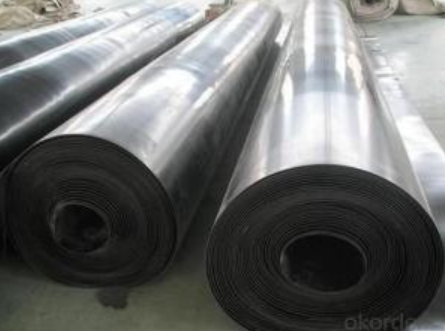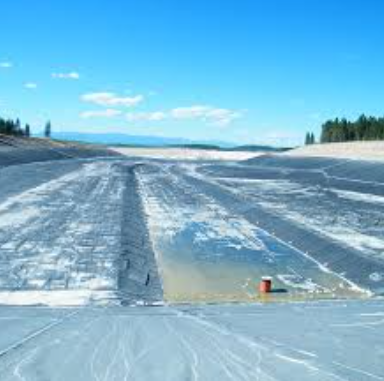- Understanding the Role of Geomembrane Liners in Waste Management
- Innovations in Geomembrane Liners for Water Management
- Geomembrane Liners: A Comprehensive Guide
- The Future of Geomembrane Liners in Civil Engineering
- Geomembrane Liners: Enhancing Landfill Stability
Manager:
WhatsApp:+86 177 0135 2670
Tel:+86 177 0135 2670
Email:marketing@okorder.com
Address:3rd Floor, No.2 Building, No.1 Sanlihe Road
Can HDPE geomembrane be used for sewage?
High-density polyethylene (HDPE) geomembranes are commonly used in the field of environmental protection. It is a kind of material with excellent impermeability and durability. However, there are many problems that need to be considered about its applicability and function as a sewage containment system. This paper will discuss whether hdpe Geomembrane can be used for sewage through analyzing various conditions which affect its use in this aspect, as well as advantages and disadvantages analysis.

Comprehending HDPE Geomembrane
Composition & Characters:
HDPE liners are made from thermoplastic polymers called high-density polyethylenes. These are plastics derived from ethylene monomers and have the ability to form an impervious barrier against liquid or gas migration. The chemical resistance, strength properties and long life span make them suitable for applications such as landfill lining systems; pond liner installations among others.
Impermeability & Containment
Properties of Barriers:
One of the reasons why HDPE geo-membranes can be utilized in keeping waste products like sewage is because they are impermeable. Its compact molecular structure acts as a wall that prevents water from passing through thus ensuring safety by containing every drop within itself without any risk of leakage into surrounding areas.
Chemical Resistance:
Sewerage systems handle corrosive substances hence it’s important to consider the type liner used should be able to withstand such environments without getting damaged easily due to exposure. This means that chemically resistant materials must be employed here i.e.; HDPE geosynthetics which have good resistance against acids bases etcetera commonly found in sewages
Mechanical Strengths:
The mechanical qualities possessed by HDPE geomembrane makes them strong enough for use where waste containment is concerned especially when dealing with fluids under high pressure. Consequently, this helps in preventing ruptures or leakages along the linings which could have occurred as a result of earth movements during construction works like settling down of structures.
Advantages Of Using HDPE Geomembrane For Sewage
Durability and Longevity:
The long life span and ability to tolerate harsh conditions without experiencing any significant degradation makes HDPE liners suitable for long-term storage. It can be said that they are built to last considering such features like resistance against UV radiation, chemicals commonly found in sewage treatment plants as well mechanical stress induced by heavy duty machinery during operation periods
Ease of Installation:
Another advantage associated with these types of materials is their ease when it comes to installation procedures since flexibility enables them easily adapt various shapes & sizes required within different configurations without necessarily necessitating welding processes thereby making tight seals possible.
Cost-effectiveness:
From time immemorial people have always wanted things which are quite cheap yet effective at same time; thus affordability has remained one major factor taken into consideration while selecting products. In relation to this context therefore given its durability coupled with minimum maintenance requirements over years can make HDPE liner cheaper compared other traditional materials used for lining sewage systems hence being economical choice among many others available today.
Environmental Compatibility:
HDPE geomembrane is environmentally friendly meaning that it does not pollute soil or water by leaching out toxic substances into them. Therefore there will be no need worry about violating any laws concerning waste management practices because no harmful elements shall find their way out through these linings
Limitations And Considerations
Temperature Sensitivity:
Polyethylenes may become weak under extreme temperatures especially on higher side where heat softens such plastics affecting their strength properties consequently leading to failure as shown during hot days in sewers located arid regions or when working hours peak at treatment plants
UV Degradation:
Sun rays contain ultraviolet rays which over time can cause chemical reactions within matter leading to degradation hence affecting its mechanical performance abilities. Thus it’s necessary protect them against direct sunlight exposure by using opaque covers or paints containing agents capable absorbing these energies thereby shielding off liners from any possible harm.

Conclusion
In summary, the impermeable HDPE geomembrane is an excellent tool for controlling and managing sewage because it is durable and cheap. It can resist chemicals, machines, and weather when used in wastewater treatment plants or storage tanks among other infrastructures of this kind. By knowing what the material has to offer as well as its downsides or limitations along with some precautions that need taking into account; engineers will be able to use this flexible liner confidently thereby improving upon dependability levels within sewer systems while also safeguarding nature from harm or breaking any laws set by authorities for such matters.
-
2024-12-05Geomembrane Liners: A Comprehensive Guide






